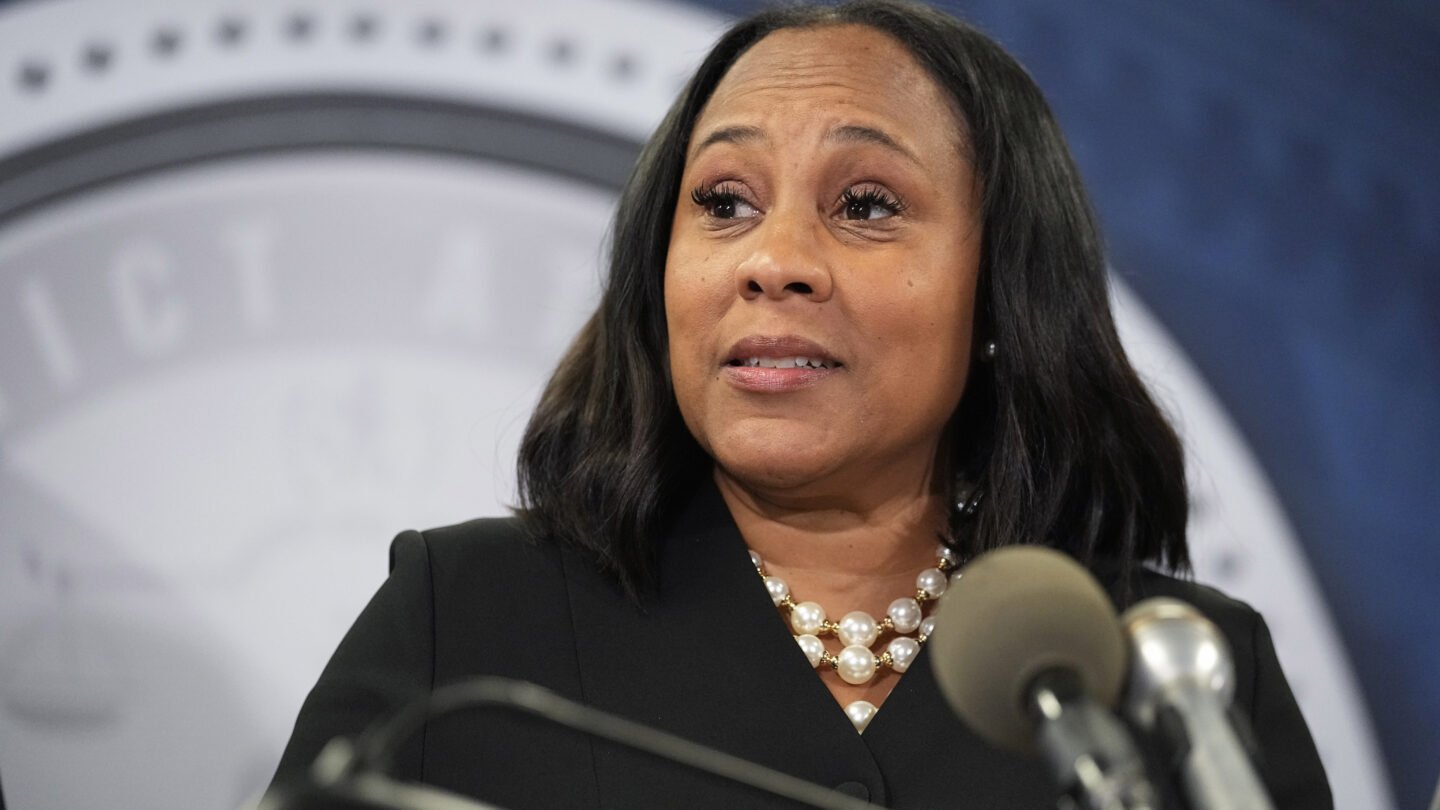Georgia Gov. Brian Kemp on Thursday offered his strongest denunciation to date of efforts by his fellow Republicans to go after Fulton County District Attorney Fani Willis, dismissing the moves as “political theater that only inflames the emotions of the moment.”
Some Republicans in Washington and Georgia have been attacking Fulton County District Attorney Fani Willis since even before she announced the indictment of former President Donald Trump for conspiring to overturn the 2020 election. Kemp said that any calls for a special session to impeach Willis or defund her office were wrong and that she had done nothing to merit removal.
A special session, the second-term governor said, “would ignore current Georgia law and directly interfere with the proceedings of a separate but equal branch of government.”
“The bottom line is that in the state of Georgia, as long as I’m governor, we’re going to follow the law and the Constitution, regardless of who it helps or harms politically,” a clearly agitated Kemp said at a news conference in the state’s capital.
“In Georgia, we will not be engaging in political theater that only inflames the emotions of the moment,” Kemp added.
The remarks are a reflection of the divide that remains between Kemp and some other Republicans following the governor’s refusal to endorse Trump’s false claims about the 2020 election and help him try to overturn his narrow loss in the state. Willis has charged Trump and 18 others, including the former state Republican Party chair, with crimes related to the effort.
Trump, meanwhile, has kept up a withering assault on both Willis and Kemp.
“Governor Kemp of Georgia is fighting hard against the impeachment of the crooked, incompetent & highly partisan D.A. of Fulton County, Fani Willis, who has allowed murder and other violent crime to MASSIVELY ESCALATE,” the former president wrote Aug. 21 on his Truth Social platform. “Crime in Atlanta is WORST IN NATION. She should be impeached for many reasons, not just the Witch Hunt (I did nothing wrong!)”
There’s little evidence to support Trump’s claim that crime is escalating — the number of homicides has fallen sharply in Atlanta this year.
Other Georgia Republicans didn’t hesitate to assail Willis, with some joining Trump in the call to impeach the Atlanta-based prosecutor.
“Fani Willis should be ashamed of herself and she’s going to lose her job,” said Republican U.S. Rep. Marjorie Taylor Greene of Georgia. “We’ll make sure of that.”
Greene spoke to reporters last Thursday outside the Fulton County Jail, shortly before Trump arrived by motorcade to submit to booking and a mug shot. That same day, House Republicans in Washington announced their own investigation of Willis.
By then, a few GOP lawmakers in Georgia were calling for a special session to impeach and remove Willis or defund her office. Others proposed amending the state constitution to let Kemp pardon Trump.
Both are long-shot prospects.
Georgia’s General Assembly hasn’t impeached anyone in more than 50 years, and with Republicans holding less than the required two-thirds state Senate majority to convict Willis, they would have to persuade Democrats.
Colton Moore, a Republican state senator whose purist brand of conservatism wins him few allies, launched a petition for lawmakers to call themselves into special session, requiring signatures by three-fifths of both houses. That too would require some Democratic support. Kemp on Thursday described Moore’s efforts, backed by Trump, as “some grifter scam” to raise campaign contributions for Moore.
Georgia voters amended the state constitution to shift pardon power from the governor to a parole board in the 1940s after a governor was accused of selling pardons. It would take a two-thirds vote of both houses to put a measure before voters to change that status, again requiring Democratic support.
And it’s not clear Kemp would pardon Trump even if he had that power. Kemp and Trump were on bad terms even before Kemp spurned Trump’s calls to overturn Georgia’s 2020 presidential election. And relations grew icier after Trump recruited former Sen. David Perdue for an embarrassingly unsuccessful Republican primary challenge to Kemp’s reelection in 2022. Kemp, like some other Republican governors, now openly argues that his party needs to move on from Trump.
At least one other top Georgia Republican, state House Speaker Jon Burns, is siding with Kemp in opposing a special session. In a letter Wednesday to fellow Republicans, he squelched talk of a special session for a second time, saying it’s impossible to take away the state money that partially funds Willis’ office without also taking away money from Georgia’s other 49 district attorneys.
“Targeting one specific DA in this manner certainly flaunts the idea of separation of powers, if not outright violates it,” Burns wrote, arguing that such a move would violate lawmakers’ oaths to uphold the U.S. and Georgia constitutions.
“We trust that our criminal justice system will deal with this matter impartially and fairly, and we will not improperly intercede in this matter in direct contradiction to the oaths we took,” Burns continued.
Looking for other options to go after Willis, some Georgia Republicans are coalescing around a plan to seek her removal by a new state prosecutorial oversight commission that begins work on Oct. 1.
The Prosecuting Attorneys Qualifications Commission was created with the aim of disciplining or removing wayward prosecutors. Republicans fought hard for the law because they said some Democratic prosecutors were incompetent or coddling criminals, improperly refusing to prosecute whole categories of crimes, including marijuana possession.
Democrats retorted that Republicans were the ones politicizing prosecutions, and some viewed the law as Republican retribution against Willis. She criticized the measure as a racist attack after voters elected 14 nonwhite DAs in the state.
Kemp, Burns and Republican Lt. Gov. Burt Jones name the commission’s five-member investigative panel to examine complaints. They also name a three-member hearing panel that decides on charges filed by the investigative panel.
Some district attorneys, not including Willis, are already suing to overturn the law. Barring court intervention, people can begin filing complaints on Oct. 1 for alleged misconduct occurring after July 1.
Such complaints could relieve political pressure on Georgia Republicans. But while Kemp said he thought the timing of the Trump indictment — coming as the 2024 presidential campaign is underway — sows distrust and provides easy pickings for those who see the district attorney’s action as guided by politics,” he didn’t believe Willis should be removed.
“I have not seen any evidence that DA Willis’ actions or lack thereof warrant action by the prosecuting attorney oversight commission,” Kemp said. “But that will ultimately be a decision that the commission will make.”









